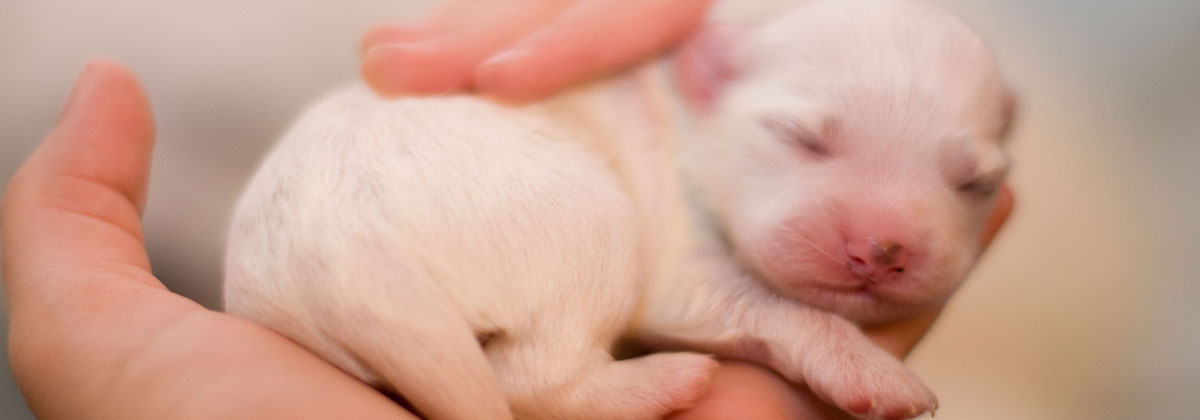19 Aug How to take care of newborn puppies
Rising newborn puppies can be challenging and rewarding at the same time rewarding. But don’t forget that it can bring you a lot of responsibilities. To raise puppies, you need to know a lot about them. Do not worry. Here we have provided essential details you need to know to grow a healthy and happy puppy.
-
Provide a healthy and safe environment
When preparing a place for newborn puppies, do not forget that they must stay at the place they were born for a few first weeks with their mother. Therefore, it is essential to choose an open and comfortable place.
You should also have easy access to their place for cleaning and sometimes helping their mother. In the early days, mom will clean their puppies’ waste, but after, they need help.
After two weeks, puppies need a bigger place where they can play freely. Do not forget that their place must be clean all the time.
-
Do not forget the warmth
Use heat lamps during the first month of puppies’life. This way, you can help to regulate their body temperature. Consider enough distance of heat temperature from puppies’ place to avoid any accident caused by burning. Their place must be big enough and divided into two sections; the warm section and a more cooling section. This way, your puppies can go to the cooler part when they feel much hot.
-
Recognise the eating habits
Mother milk provides all the nutritional needs of newborn puppies in the first four weeks of life. If the mother of your newborn puppy is not with them for any reason, be sure to consult a veterinarian about feeding methods. Veterinarians can show you the best way to feed a newborn dog. For the first few weeks, puppies should be fed through a bottle or syringe.
During the first week of life, puppies usually need to be fed at least every two hours. The older the puppies are, the less food they need. At about four weeks old, you can also give them solid foods. Replace warm water with milk when you want to change your dog’s eating habits and preparing them for eating regular food. Give your dog warm water several times a day instead of milk, and gradually replace it with milk. For changing the eating habits, consult with a veterinarian.
-
Consider health problems
Rising a healthy puppy is somehow challenging. If you want your puppy to be happy, you should take care of her/his health. Healthy suck reflex, a normal urethra and anus, pink and moist gums and mucous membranes, and a healthy coat are the signs of a healthy dog.
The most important concern for having a healthy newborn puppy is body temperature regulation. Puppies are particularly prone to disease and infection. Low temperatures can have a negative effect on their immune system. It also affects their ability to nurse and digest food. If your puppy’s body temperature is low, gradually warm it and refrain from feeding him/her until her/his body reaches a moderate temperature. This way, you can prevent digestive problems.
Grooming points about newborn puppies
- Start grooming early
It may still be believed that puppies should not be groomed until they are six months old. Still, according to modern information and professional veterinarian advice, it is best to start the grooming process as soon as possible. By starting basic grooming in the early weeks of life, you can prepare your puppy for a full grooming session at the age of 16 weeks.
- Provide a fun grooming session
Baby puppies are a little scared when they first want to be groomed. But how to prepare them for a quiet grooming session, is essential:
- Never groom your newborn puppy yourself. Professional dog groomers know how to take the stress away from your puppy and provide a calm, stress-free environment.
- Before taking your dog to the groomer, arrange a training session and reward all your puppy’s positive behaviours during the training grooming session.
- Never hold your dog tightly to clean it. Keep your puppy steady but not tight. When your puppy squirms, do not try to stop him/her and immediately release him/her. Teach your puppy that he/she can get rewards for being relax and calm. Otherwise, he/she will not receive a reward.
- Regular grooming sessions are critical
Try to take your puppy to the groomer regularly and make grooming one of his/her life habits. Dogs can recognise the order. Also, grooming sessions for dogs are usually a little stressful early on. But regular sessions get the dog’s mind ready for the grooming session. This way, your dog will no longer have a problem with grooming and will be eager to see his/her groomer.




No Comments